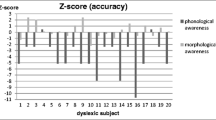Summary
The present study explored a possible relationship between reading difficulties and speech difficulties. Dyslexic and normal readers, matched for Reading Age, were compared first on a reading task and secondly on a speaking task.
In the first experiment, the two groups were asked to read nonsense words aloud. Both groups were able to read one-syllable nonwords equally well but the dyslexics had more difficulty than the normal readers when asked to read two-syllable nonwords. Moreover, they found two-syllable nonwords containing consonant clusters particularly difficult. The probability of their making an error increased with the number of consonant clusters.
In the second experiment, the subjects were required to repeat real words and nonsense words of two, three, or four syllables. Both groups found nonsense words more difficult to repeat than real words. However, the relative difficulty of nonsense words over real words was greater for the dyslexic group. Their difficulty was especially marked when they had to repeat four-syllable nonsense words.
Thus, in both experiments the dyslexic readers were more affected by the phonological complexity of the stimuli than the normal readers were. Hence, it was suggested that the dyslexic readers tested were subject to a general phonemic deficit which affected their ability to process both written and spoken words.
Similar content being viewed by others
References
Boder E (1971) Developmental dyslexia: Prevailing diagnostic concepts and a new diagnostic approach. In: Myklebust HR (ed) Progress in learning disabilities, vol 2 Grune & Stratton, New York
Bradley L, Bryant PE (1978) Difficulties in auditory organization as a possible cause of reading backwardness. Nature 271:746–747
Ehri LC (1980) The Development of Orthographic Images. In: Frith U (ed) Cognitive processes in spelling. Academic Press, London
Gibson EJ, Levin H (1975) The psychology of reading. MIT Press, Cambridge, Mass.
Guthrie JT, Seifert M (1977) Letter-sound complexity in learning to identify words. J Educ Psychol 69:686–696
Hogaboam T, Perfetti CA (1978) Reading skill and the role of verbal experience in decoding. J Educ Psychol 70:717–729
Ingram TTS (1970) The nature of dyslexia. In: Young FA and Lindsley DB (eds) Early experience and visual information procession in reading disorders. National Academy of Sciences, Washington DC
Liberman IY, Shankweiler D (1976) Speech, the alphabet and teaching to read. In: Resnick L, Weaver P (eds) Theory and practice of early reading. Lawrence Erlbaum Associates, Hillsdale NJ
Marcel AJ (1980) Phonological representation. In: Frith U (ed) Cognitive processes in spelling. Academic Press, London
Miles TR (1974) The dyslexic child. Priory Press, Hove, Sussex
Morton J (1969) A functional model for memory. In: Norman DA (ed) Models for human memory. Academic Press, New York
Naidoo S (1972) Specific dyslexia. Pitman, London
Perfetti CA, Hogaboam T (1975) Relationship between single word decoding and reading comprehension skill. J Educ Psychol 67:461–470
Rutter M (1975) Helping troubled children. Penguin, Harmondsworth
Rutter M, Tizard J, Yule W, Graham P, Whitmore K (1976) Research report, Isle of Wight studies, 1964–1974. Psychol Med 6:313–332
Seymour PHK, Porpodas CD (1980) Lexical and nonlexical processing of spelling in developmental dyslexia. In: Frith U (ed) Cognitive processes in spelling. Academic Press, London
Smiley SS, Pasquale FL, Chandler CL (1976) The pronounciation of familiar, unfamilar and synthetic words by good and poor adolescent readers. J Reading Behav 8:289–297
Snowling MJ (1980) The development of grapheme-phoneme correspondences in normal and dyslexic readers. J Exp Child Psychol 29:294–305
Vellutino FR (1979) Dyslexia: theory and research. MIT Press, Cambridge, Mass.
Venezky RL (1970) The structure of English orthography. Monton, The Hague
Yule W (1967) Predicting reading ages on Neale's analysis of reading ability. Br J Educ Psychol 37:252–255
Author information
Authors and Affiliations
Rights and permissions
About this article
Cite this article
Snowling, M.J. Phonemic deficits in developmental dyslexia. Psychol. Res 43, 219–234 (1981). https://doi.org/10.1007/BF00309831
Issue Date:
DOI: https://doi.org/10.1007/BF00309831



